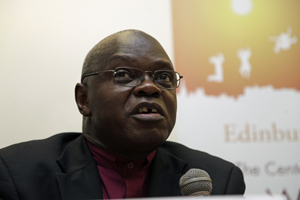
A report from Ekklesia…
Dr John Sentamu issued a reminder at the closing worship service of the Edinburgh 2010 conference that the verdict on Christianity rests on the shoulders of its adherents.
The Anglican archbishop of York appealed on behalf of “the crucial importance of Christian witness.”

PICTURE: Gary Doak
“Human activity only begets human activity. The prophetic Word and the Spirit make us live.”
– Archbishop John Sentamu
Alluding to the Gospel account of Peter’s denial of Christ before his crucifixion, Dr Sentamu added: “Jesus today is on trial in the court of the world by our lips and lives. Jesus and His Gospel are being judged.”
Encouragement to exercise loving hospitality towards others and humility in Christian outreach formed the refrains of Edinburgh 2010’s closing celebration and of the meeting’s Common Call in which delegates expressed “full awareness that God resists the proud, Christ welcomes and empowers the poor and afflicted, and the power of the Holy Spirit is manifested in our vulnerability.”
Archbishop Sentamu said in his sermon, “Human activity only begets human activity. The prophetic Word and the Spirit make us live.”
In June 1910, a groundbreaking World Missionary Conference drew delegates from churches and mission societies throughout the earth to the Assembly Hall of the Church of Scotland, set on The Mound near Edinburgh Castle and St Giles Cathedral. One hundred years later, on the afternoon of Sunday 6th June, more than a thousand worshippers gathered in the Assembly Hall to mark the end of the Edinburgh 2010 conference surveying world Christianity and the potential for common witness to Jesus Christ in the 21st century.
Among participants in this closing celebration were the nearly 300 delegates from some 60 nations and a broad range of Orthodox, Catholic, Anglican, Protestant, Evangelical, Pentecostal, independent and uniting churches.
A “Common Call” to renewed commitment, affirmed by this year’s conference, was addressed to the Christians of this era and affirmed at the climax of the closing celebration.
Diversity was clearly on display in the ecclesiastical vestments and national dress worn by worshippers in the Assembly Hall. Prayers were led in several of the world’s languages, and hymns were sung from Africa, Asia, the Americas and Oceania as well as disparate cultures of Europe. Indian dancers from Selly Oak Colleges, Birmingham and an African choir were among the many forms and voices that animated the proceedings.
Historians imagined what a delegate from 1910 would make of this year’s deliberations. Among other things, they noted, it would have come as a shock that the current celebration was being video-streamed live throughout the world. On the other hand, how would a delegate from 2010 transported to an earlier time survive without the capacity to e-mail?
The presence of two direct descendants of 1910 delegates from Asia was acknowledged: the granddaughter of Yun Ch’iho from Korea and the grandson of John Rangiah who had represented the Indian community in South Africa. Bishop Devamani of Dornakal, Church of South India, read excerpts of the speech given in 1910 by a young V.S. Azariah, later the first bishop of Dornakal.
Further presentations stressed the need for mutuality in mission: westerners have much to learn from Christians of the east, and northerners must discover how to show greater humility and a willingness to learn from the global south.
Archbishop Sentamu’s sermon followed a reading of Ezekiel’s prophecy that brought new life to a valley of dry bones. “We must help our churches by acting prophetically, speaking out for freedom against injustice,” said the archbishop – who himself experienced the weight of Idi Amin’s dictatorship in Uganda, and who has spoken out strongly against oppression in Zimbabwe.
He continued: “Our forebears have (spoken and acted) in the past against slavery and more recently against apartheid, world debt and poverty. We must continue to speak out against injustice shown to asylum seekers and all in need.”
“Our forebears have (spoken and acted) in the past against slavery and more recently against apartheid, world debt and poverty. We must continue to speak out against injustice shown to asylum seekers and all in need.”
– Archbishop John Sentamu
The Archbishop added: “As we do this, we must remember that speaking prophetically is not the same as condemning other people’s failures, but rather helping us all towards the acceptance of common goals which uplift the heart. To help lift up the heart of a nation is an exciting challenge, and it is one which we can do together, because it is what God has called us to as part of our mission and discipleship.”
The previous evening, a final discussion session at the conference reviewed the study processes leading to 2010 and the deliberations undertaken in small groups and plenary conclaves on the Pollock Halls campus of Edinburgh University.
“This is probably the most comprehensive mission gathering since 1910,” remarked Vinoth Ramachandra, a Sri Lankan leader of the International Fellowship of Evangelical Students. Like other speakers, Ramachandra recognised many promising developments in the 2010 gathering yet expressed disquiet at the high percentage of religious and academic professionals compared to the many lay workers present a century earlier. He called this a “blind spot” in contemporary church gatherings, a failure to realise that “the primary work of mission takes place in the daily lives of ordinary Christian men and women”.
The next such world-wide event, he said, will profit from an attempt to include more members of the laity, women, youth and representatives from the southern hemisphere. Existing boundaries need to be “deconstructed, though not destroyed”. In particular, “the artificial boundary between clergy and laity needs to be deconstructed”. The essential thing in these times, Ramachandra said, is that “boundaries of all kinds must be eroded.”





